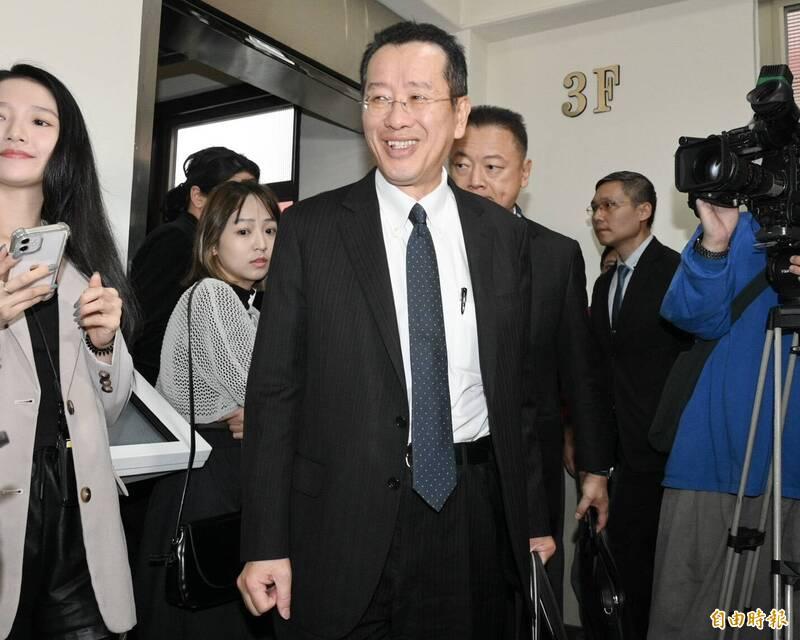Data allegedly leaked by former air force pilot Shih Chun-cheng (史濬程) was academic research from a development phase, not actual usage data, Minister of National Defense Wellington Koo (顧立雄) said today.
The Ministry of National Defense yesterday confirmed a media report that a retired air force major leaked classified documents to Chinese intelligence agents regarding the air force’s use of Hsiung Feng III anti-ship missiles mounted on aircraft, along with information on Taiwan’s response to Chinese incursions into the nation's air defense identification zone.
The ministry first received reports from military personnel in January 2023 that triggered a joint-defense mechanism and coordination with the military police to investigate the matter, Koo said.

Photo: Tu Chien-jung, Taipei Times
That military personnel reported the matter shows that the armed forces' education and counterintelligence improvements have borne fruit, he said.
To keep improving counterintelligence capabilities, the ministry would continue to educate soldiers on counterintelligence, increase background checks on personnel and augment personnel in the Military Intelligence Bureau, he added.
The ministry would also seek to emulate the US model for access to confidential information by having access based on background checks, need and confidentiality, rather than based on rank, Koo said.
In the past, special background checks were only necessary for some ranks, but moving forward, only those who have passed a review would be granted access, he said.
National Chung-Shan Institute of Science and Technology chief executive officer Cheng Yi-cheng (程一誠) said that while it is not convenient to publicly provide information on the Hsiung Feng III’s development, the leak had no effect on research.
The leak dates to earlier in the project, which is still ongoing, Cheng said.
In a separate case regarding a retired soldier's lost phone allegedly ending up in China and having its contents leaked on Sina Weibo, Koo said photographs on the device were approved to be shared publicly and the phone had already been reported as lost.
The photos allegedly show group chats from Line, names of officers and soldiers, photos in which the 137th Brigade is visible and the contact information of the 8th Army Corps.
The situation highlights the utility of the armed forces’ mobile device management systems, which locked down functions on the device and prevented more sensitive information from being leaked, Koo said.

The inspection equipment and data transmission system for new robotic dogs that Taipei is planning to use for sidewalk patrols were developed by a Taiwanese company, the city’s New Construction Office said today, dismissing concerns that the China-made robots could pose a security risk. The city is bringing in smart robotic dogs to help with sidewalk inspections, Taipei Deputy Mayor Lee Ssu-chuan (李四川) said on Facebook. Equipped with a panoramic surveillance system, the robots would be able to automatically flag problems and easily navigate narrow sidewalks, making inspections faster and more accurate, Lee said. By collecting more accurate data, they would help Taipei

TAKING STOCK: The USMC is rebuilding a once-abandoned airfield in Palau to support large-scale ground operations as China’s missile range grows, Naval News reported The US Marine Corps (USMC) is considering new sites for stockpiling equipment in the West Pacific to harden military supply chains and enhance mobility across the Indo-Pacific region, US-based Naval News reported on Saturday. The proposed sites in Palau — one of Taiwan’s diplomatic allies — and Australia would enable a “rapid standup of stored equipment within a year” of the program’s approval, the report said, citing documents published by the USMC last month. In Palau, the service is rebuilding a formerly abandoned World War II-era airfield and establishing ancillary structures to support large-scale ground operations “as China’s missile range and magazine

A 72-year-old man in Kaohsiung was sentenced to 40 days in jail after he was found having sex with a 67-year-old woman under a slide in a public park on Sunday afternoon. At 3pm on Sunday, a mother surnamed Liang (梁) was with her child at a neighborhood park when they found the man, surnamed Tsai (蔡), and woman, surnamed Huang (黃), underneath the slide. Liang took her child away from the scene, took photographs of the two and called the police, who arrived and arrested the couple. During questioning, Tsai told police that he had met Huang that day and offered to

BETTER SERVICE QUALITY: From Nov. 10, tickets with reserved seats would only be valid for the date, train and route specified on the ticket, THSRC said Starting on Nov. 10, high-speed rail passengers with reserved seats would be required to exchange their tickets to board an earlier train. Passengers with reserved seats on a specific train are currently allowed to board earlier trains on the same day and sit in non-reserved cars, but as this is happening increasingly often, and affecting quality of travel and ticket sales, Taiwan High-Speed Rail Corp (THSRC) announced that it would be canceling the policy on Nov. 10. It is one of several new measures launched by THSRC chairman Shih Che (史哲) to improve the quality of service, it said. The company also said